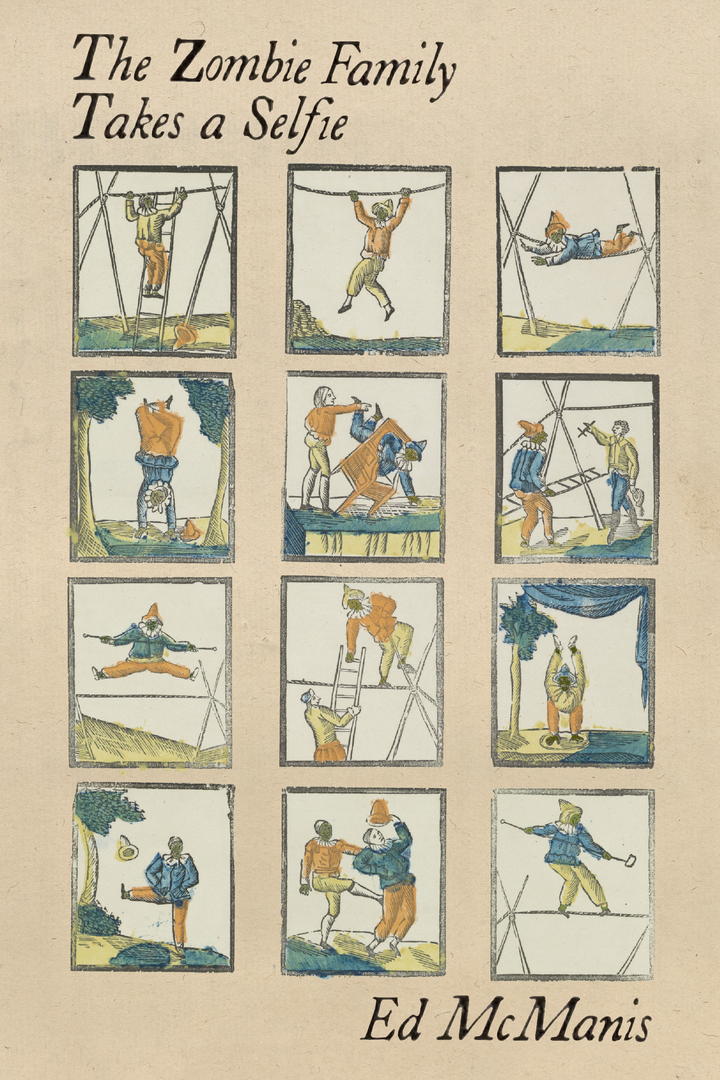 Reviewed by Magdalena Ball
Reviewed by Magdalena Ball
The Zombie Family
Takes a Selfie
by Ed McManis
Bottlecap Press
$10, 40 pages
The nineteen poems that make up The Zombie Family Takes a Selfie are like a boxful of family snapshots. They are familiar and wry, evoking the kind of pain that comes from the kind of deep connection that only families have. McManis explores the impact of religious faith across generations, its constraints, community, hypocrisy, and the damage and beauty it has wrought against a lens of life change and epiphany. Many of the poems are metapoetic, exploring both the nature of what the poem is doing and can do, while deftly moving through mythology, Biblical texts, dreams and fantasies, while always grounding the people and settings in a casual domesticity. This may seem like a contradiction, but McManis manages the balance and shifts perfectly:
I’m hoping for wings next, maybe
a griffin, even a stone lion,
something on horseback, though I
suspect the gargoyle rising
in my chest, nibbling on my heart
will consume me first. (“Statues”)
Family features in most of the work in this collection. The repeated characters and situations create a pattern of connectivity that brings the poems in conversation with one another. A younger sister is in almost all of the poems, as we rifle through her books, or explore her struggles, disappearance, abortion, divorce, losing faith and finding something else – humanity, pain, love. This character or several little sister characters are woven through the work, in poems that take a brotherly perspective, solicitous, unconditional, with a hint of contrition:
If Jesus couldn’t find
your jagged breadcrumbs
in the Catholic dark then
the Angel Moroni hasn’t a
clue. (“The Divorce”)
There are other familial characters: zombie uncles, deeply religious tough grandmothers, a godless WWI veteran grandfather, several brothers, mother, father, each with a variety of roles, perspectives, and identities, moving almost imperceptibly between the abstract and the concrete, often with a tender comic element
He’s not sure when he quit listening, sometime after forty
in the valley of another deposition and his partner’s lips were
moving like a cheaply dubbed foreign movie
half a second behind. (“Family Venery”)
The speaker also slides between personae – moving in and out of first and third person, as observer or as protagonist, always with a sense of open culpability. There is always a sense, whoever the character, that they are also functioning as a mirror. Dancing too features in several poems – either in the imagination, as a memory, a dream, or literally, on a dance floor:
The first move—his best—the one
he caught her with toe pointed
his sole drags back across the wood
heel stomps and time
its load drops from his shoulders
rhythm straightens him, (“On Their 35th Anniversary”)
Throughout the book the imagery is often strikingly apt, with distinctive and original metaphors that play across memory, dreams, visions, the mythical, and the spiritual without ever losing the sense of the everyday lives at home of these characters, or the deep sense of the connections between members of this somewhat damaged, wacky, but engaging family:
and here you wait
fumbling to light
your one candle,trying to see
the outline
of your family (Flicker)
The Zombie Family Takes a Selfie is a thin book–a chapbook easily read in one sitting, but the size belies its complexity or the way that it encourages multiple readings, and how it draws the reader into thinking about their own family and the many cultural, mythical and moral elements that we all grapple with.